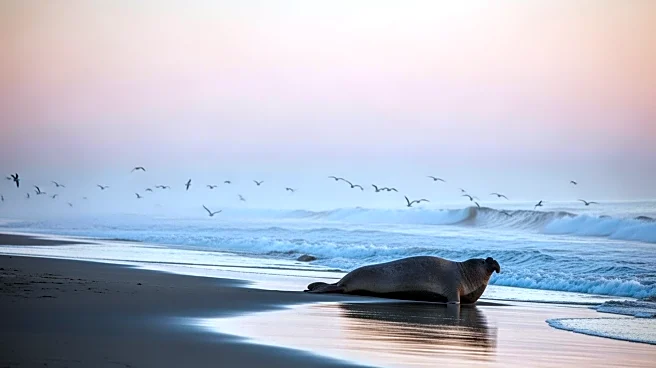What's Happening?
A research team led by Connor Bamford from the British Antarctic Survey has reported a significant decline in elephant seal populations on South Georgia Island due to the H5N1 bird flu virus. Between 2022
and 2024, there was a 47% drop in breeding females in the island's largest colonies. The virus, which has been affecting wildlife globally, has particularly impacted elephant seals, sea lions, and fur seals in the Southern Hemisphere. Ralph Vanstreels, a marine ecologist with UC Davis, noted that two-thirds of southern elephant seal colonies are now infected, with the virus spreading through South American sea lions. Despite the devastation in the south, northern elephant seals and marine mammals along the Pacific Coast have so far been spared.
Why It's Important?
The spread of H5N1 bird flu among marine mammals poses a significant threat to biodiversity and ecosystem stability. The decline in elephant seal populations could disrupt the food chain, as their placentas serve as a food source for coastal animals, and their foraging activities bring nutrients to the ocean surface. The virus's ability to mutate and spread among mammals raises concerns about potential transmission to humans and other wildlife. The situation highlights the need for monitoring and research to understand the virus's impact and prevent further spread.
What's Next?
Researchers are closely monitoring the situation to determine if the virus will spread to northern populations along the California coast. Genetic analyses are being conducted to understand the mutations that allow the virus to pass between mammals. The scientific community is on alert for any signs of the virus moving north or affecting human populations. Conservation efforts may be needed to mitigate the impact on affected species and ecosystems.
Beyond the Headlines
The outbreak underscores the interconnectedness of global ecosystems and the potential for diseases to cross species barriers. It raises ethical questions about wildlife management and the human role in preventing such outbreaks. Long-term shifts in marine biodiversity could result from the loss of key species, affecting fisheries and coastal communities reliant on marine resources.









